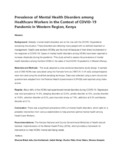Please use this identifier to cite or link to this item:
http://ir-library.mmust.ac.ke:8080/xmlui/handle/123456789/2170Full metadata record
| DC Field | Value | Language |
|---|---|---|
| dc.contributor.author | Jaika, Silvester Ndori | - |
| dc.contributor.author | Kathukumi, Ken | - |
| dc.contributor.author | Maingi, Zadok | - |
| dc.contributor.author | Tibbs, Charles | - |
| dc.contributor.author | Odera, Peter | - |
| dc.contributor.author | Konyole, Silvenus | - |
| dc.date.accessioned | 2023-04-24T06:53:49Z | - |
| dc.date.available | 2023-04-24T06:53:49Z | - |
| dc.date.issued | 2022-12-05 | - |
| dc.identifier.uri | https://www.ajol.info/index.php/ajhs/article/view/237596 | - |
| dc.identifier.uri | http://ir-library.mmust.ac.ke:8080/xmlui/handle/123456789/2170 | - |
| dc.description.abstract | Background: Globally, mental health disorders are on the rise with the COVID-19 pandemic worsening the situation. These disorders are affecting many people with no defined treatment or management. Health care workers (HCWs) are the most hit because of their direct involvement in the response to COVID-19. Cases of mental health disorders among HCWs have been reported to increase drastically during the pandemic. This study aimed to assess the prevalence of mental health disorders among frontline HCWs in the wake of the COVID-19 pandemic in Western Kenya. Materials and Methods: The study adopted a cross-sectional descriptive study design. A sample size of 356 HCWs was calculated using the Yamane formula (1967) N/ (1+N (e2)) and participants were recruited using the stratified sampling technique. Data was collected using a semi-structured questionnaire adopted from the Patients Health Questionnaire 9 (PHQ9) and reported using Index scores. Results: About 44% of the HCWs had experienced mental disorders during COVID-19. Depression was most prevalent at 14.6%, sleeping disorders at 12.6%, phobic disorder at 12%, anxiety disorder at 10.8%, attention disorder at 8.2%, post-traumatic stress at 7.6%, addiction at 6.3% and bipolar disorder at 5.1%. Conclusion: There was a significant prevalence (44%) of mental health disorders, which calls for a probable intervention from various stakeholders to help promote optimal mental health among Health Care Workers. Recommendations: The Kenyan National and County Governments Ministries of Health should fasttrack implementation of the Mental Health Policy (2016), which provides a framework for intervention to meet HCWs' mental well-being needs. | en_US |
| dc.language.iso | en | en_US |
| dc.publisher | African Journal of Health Sciences | en_US |
| dc.subject | Prevalence,Mental Health, Disorders, Healthcare Workers, Context of COVID-19, Pandemic, Western Region | en_US |
| dc.title | Prevalence of Mental Health Disorders among Healthcare Workers in the Context of COVID-19 Pandemic in Western Region, Kenya | en_US |
| dc.type | Article | en_US |
| Appears in Collections: | Gold Collection | |
Files in This Item:
| File | Description | Size | Format | |
|---|---|---|---|---|
| Prevalence of Mental Health Disorders among Healthcare Workers in the Context of COVID.pdf | 468.91 kB | Adobe PDF |  View/Open |
Items in DSpace are protected by copyright, with all rights reserved, unless otherwise indicated.
